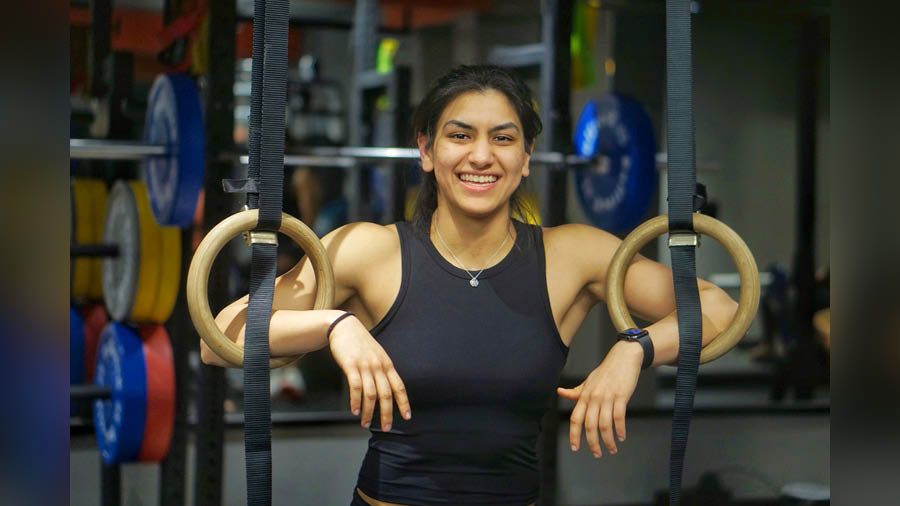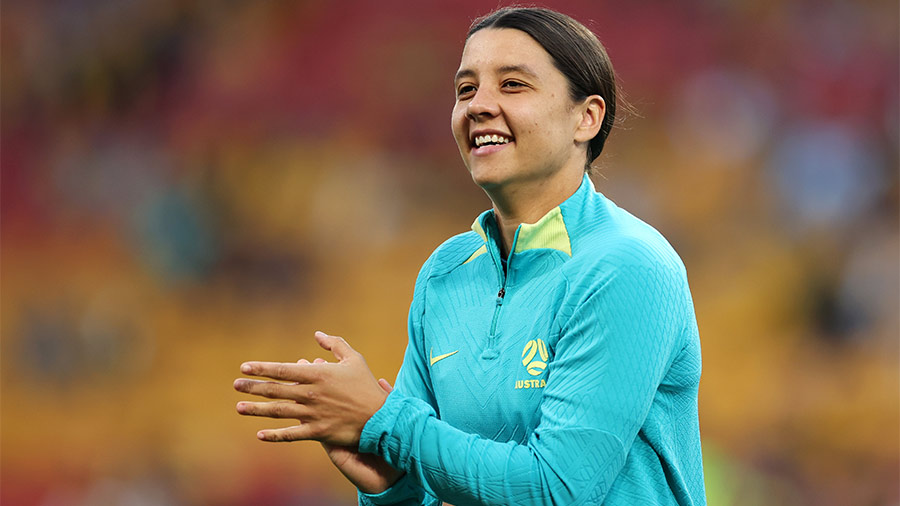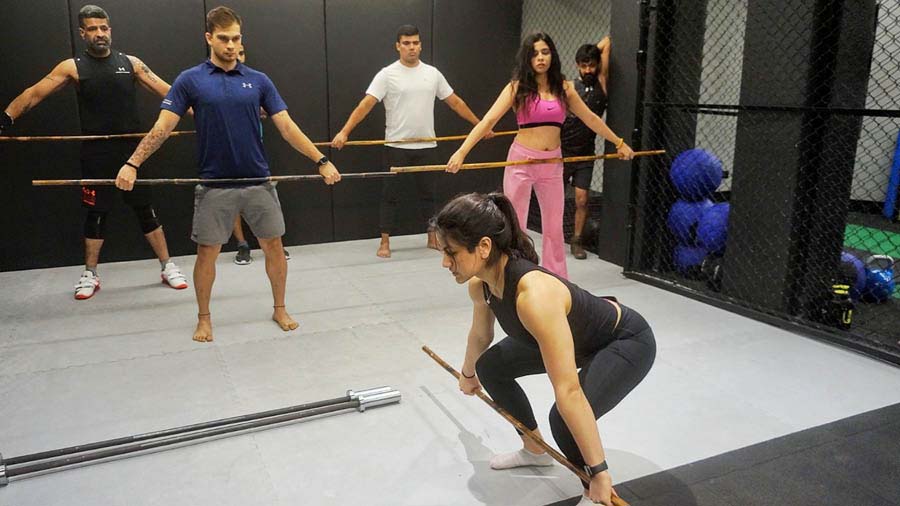Among the things that tip the scales at 170 kgs, you’ll find a 300cc bike, a grand piano, a baby elephant, and the remarkable deadlifts of Raagini Rampal. This 23-year-old Australian sensation has experienced a meteoric rise in the world of weightlifting. From her humble beginnings with YouTube tutorials in a local park, she transitioned to competing at the national level in less than a year. During a well-deserved break in the City of Joy, Raagini graciously shared the whirlwind story of her journey with My Kolkata.
Born in Kolkata, sport was a major part of Raagini’s life from the very beginning. “Like every woman in my family, I had to go to Loreto House. They expected me to be ‘the good child’, but I was more like the ‘gets-thrown-out-of-class child’. I was always more inclined towards sport,” she chuckled.
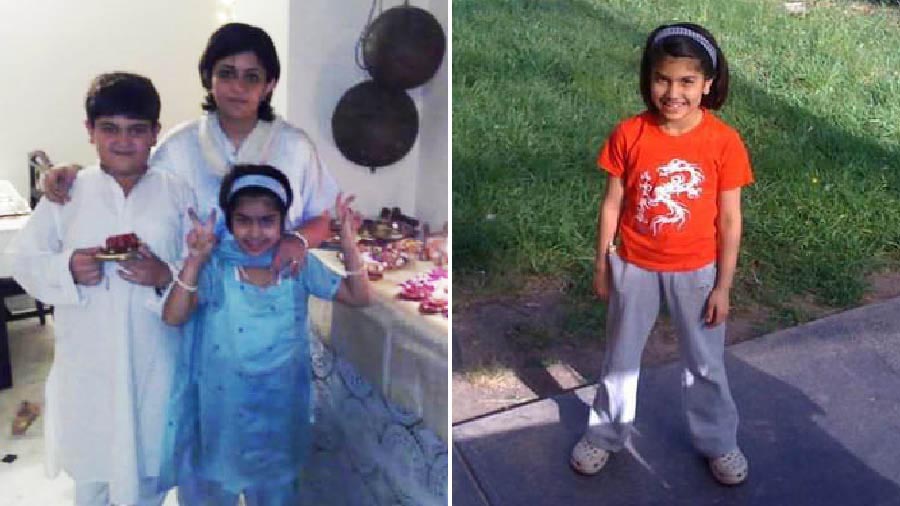
Raagini spent her formative years in (left) Kolkata, before moving to Australia with her family
While her family dismissed her passion at first, she remembered the instance when she won over them. Raagini recalled, “I once told my mom that I would run a race and place first. Since I was a naughty kid, she just thought I was lying. But she still came to the race, where I ended up beating everyone by a mile. Both my mom and my brother were like, ‘She’s actually really good!’ That’s how my sporting journey started.” From then on, she would divide her time between The Tollygunge Club, CCFC and Saturday Club, taking part in an array of activities like golf, karate and dance. Life was good, and sport was life. But things were about to change.
“When I was nine, my dad suggested that we move to Australia as my aunt lived there. We left behind everything that we enjoyed doing here, including sport, which both my dad and I loved. Our lifestyle changed completely,” she added. Both of Raagini’s parents had moved there with high-paying jobs, but within two months, they had to move to student jobs because of harsh circumstances. “My dad was working in a petrol pump, while my mom worked at a call centre. Their education didn’t mean much. My brother and I had to bring ourselves up. The next decade was difficult, making us realise the importance of hard work.”
Staying in touch with sport also became increasingly difficult. Ragini continued, “Luckily, Australian schools have a major focus on sport, so everyone plays something there. But you can only go so far at the school level. To play at the competitive level, I needed to go to athletic meets and get proper training, and we didn’t have the money for that. That’s just how life is sometimes.”
Another unexpected hindrance was racism. Initially, Raagini’s family moved to a predominantly white locality, one hour from Melbourne. Apart from the twisting of her name and the funny stares, she remembers the cultural contrast, which was evident in everything from the language to the food. She said, “In 2008-09, people weren’t used to migrants. My brother and I got bullied a lot. I was good with sport, so I would just go, ‘Hey, I’m not even from this country and I beat you in your sport.’ But I’d still get excluded from groups and never had close friends, just because I was different.”
Raagini remembered that the harshness of reality only dawned upon her when her aunt also moved away. “I realised that it was just us four, and I couldn’t rely on anyone else. To this day, I introduce myself everywhere as, ‘Hi, I’m Raagini, you can call me Rags.’ I sometimes catch myself saying it in India, where people can pronounce my name. But I’ve been saying it for so long that it’s ingrained in me,” she added.
Things began to improve when she was 13. Her family moved to Sydney, and her parents got better jobs. The new city was multicultural, with a lot of Indians. “I felt like I belonged there. It was a huge city and hard to get around, so I had to quit athletics. Instead, I started playing golf every day with my dad.”
When it was time to choose a career, Raagini veered towards journalism. However, mid-way through her time at varsity, COVID-19 shut down the world, and Australia went into lockdown. She vividly remembers sitting at home for long periods and hating her life. In 2021, a television broadcast of another woman making history, changed her life. Raagini recalled, “I was watching the 55 kg Weightlifting category in the Tokyo Olympics, and saw Hidilyn Diaz become the first Filipino to bag an Olympic gold. I immediately thought, ‘I can do this’.”
Raagini had finally found her calling. She wasn’t going to let a global lockdown get in the way of her dreams. “We could only go out within a 5km radius. I had a barbell at home, and would take it to the nearest park in my dad’s car. I found a YouTube video on Olympic lifting and started practising. I must have broken the barbell thrice by throwing it on the dirt,” she reminisced.
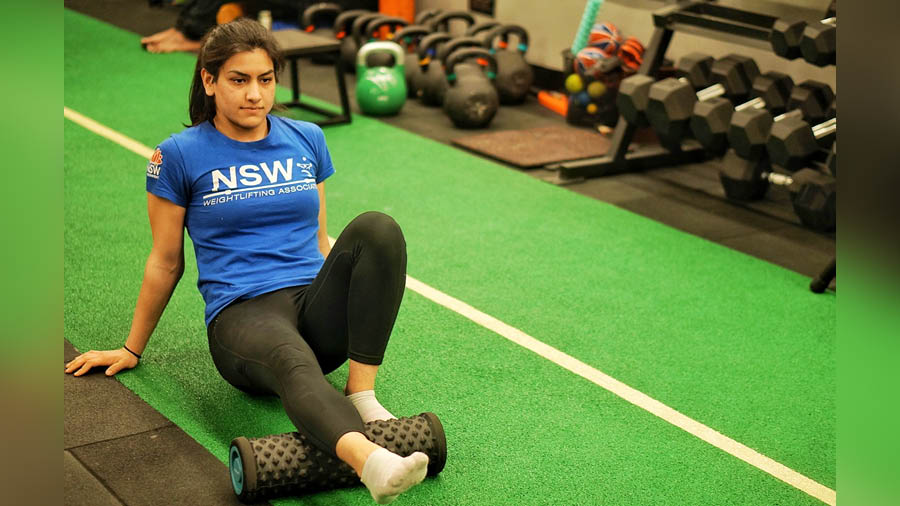
Before Raagini’s family moved to Australia, she had a quintessential Kolkata childhood, oscillating between Tolly and Saturday Club Soumyajit Dey
Once the lockdown ended, she joined a local club and set herself two goals to achieve by the end of the year. The first was to break the record in her weight category. The second was to participate in her first competition. She wrote both of these goals on a piece of paper and stuck it to her mirror. “Every morning, I would wake up and look at it,” she smiled.
After getting her journalism degree, she also veered her focus on training people and giving back. “I was helping my friend in the gym once, and the owner said that I couldn’t provide personal training there. She threw me out, and my brother suggested that if I was so good without a certificate, I should just get one. Within a year, I had my certification, and I now work at that very gym,” she laughed.
As for her own training, she found a fitness centre run by a family of sportspersons who have represented Australia. After training with them for a while, she came to a major realisation. “I found that I had great strength because of genetics, but my technique was absolute sh*t. I did my first competition with them and felt no pressure whatsoever. When I got to the platform, it felt like I was meant to do this and I just wanted to keep going. It was the best day of my life,” said Raagini.
Within three months, she had broken a state record at another competition, achieving her second goal. Reflecting upon it now, she said that her approach was incorrect. She explained, “I was really happy at that moment, but after that I felt nothing. It’s like buying a car, where you constantly work towards it, but once you have it you aren’t sure what to do with it.”
Her last National-level competition gave her a lot to think about. She continued, “When I saw that my numbers were at the top of the 59 kg category in the draft-list, I thought the competition was in the bag. I didn’t know what happened, but after two perfect lifts, I got a series of red lights and dropped from the first to third.” As she cursed herself, the referees made her realise that while she physically outperformed everyone else, she needed to work hard on the mental department.
Heading to India right after the competition, Raagini spent the entire flight assessing what went wrong. After landing, the first thing she did was gorge on local shingaras (Her week-long shingara tally stands at 23). The second thing she did was reflecting on her coach’s feedback. She said, “My goal was to secure the Australian suit, make it to the national team, and win a medal. He made me realise that I put too much emphasis on achievements. Every time I screwed up, my mind said, ‘There goes the Commonwealth Games’. I needed to look at the characteristics I must possess when I lift the weights. While approaching the bar, my target had to be mental strength, and the achievements would come. The best part was in the process.”
After competing for over a year, Raagini feels like she finally has a broader perspective. She reaffirmed that there was more to Olympic lifting, than just lifting heavy. “When you start getting better at a sport very quickly, the lack of experience starts to show. A 28-year-old who has been lifting for 10 years approaches the bar very differently from me, purely because of experience. Older people win more because they compose themselves better on the platform. You can be as strong as you want, but when you lose your concentration on the platform, you’re gone.”
It is this gusto that drives her to keep growing. “I’m generally very hard on myself. I feel like I would have been a different person if I had started as a teenager, and have lost a lot of opportunities in the process. So now, there’s no easy way. Even if I have to fix something in the gym for four hours, I’ll do it. It’s not healthy, but to reach the level I want, I don’t have the option to say, ‘My knees hurt’,” she quipped.
The art of training has also helped her learn from others, and to think about the long game. “I now understand how long it takes to develop strength. When I help someone do their first squat or deadlift, it’s a beautiful moment where I feel happier than they are.” It has also taught her to always be mindful of the basics. “I always make everyone practice with a stick before going to a barbell. I can lift all these heavy weights, but for three months before the nationals, I practise my fundamentals with the stick too. I believe that no one is above the stick. Humbling yourself is the best way to learn.”
But beyond the Olympics and record-breaking laurels, it's all about family for Raagini. “My end goal is to open a series of commercial gyms around Australia and make enough money to support my parents. I want to help my mom pursue the cake business she always wanted, and my dad to have a life where he can play golf at 3pm. They sacrificed their lives to give us a better life, and it’s only fair to give back,” she signed off.
